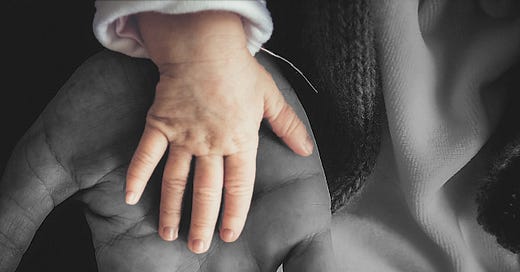Absentee Fathers and the Divine Masculine
Ways an absentee dad damaged my relationship with the Christian god
“God is our father,” the priest said warmly to the congregation of school children, his arms outstretched.
Oh. So he’s not there, I thought.
He proceeded into a homily about fathers and the ways the Christian diety has parallels with our fathers on earth. God was presented as a sort of goldilocks figure: kind but stern, encouraging but strict, loving but distant. Yet in the end, he was said to always love us, just like our actual fathers.
As a child amongst a sea of the upper middle class to rich kids who almost all had nuclear families, I was able to figure out that the priest’s message was meant to reflect the lived experiences of my classmates and not me that day. My father and mother were divorced before I even could remember him, and he was indeed distant just like the Christian god, states away and not checking on me a single time in my childhood. Today, with Father’s Day coming up, I’d like to explore some of the impacts that’s had on me and continues to have as I search for the divine masculine in my life.
Prayers For God and Father Unanswered
As a kid, I would curiously ask questions. What does my dad look like? What does he do? Why isn’t he here? My family provided answers for these questions though the responses were often tinged with anger at promises not met.
I took those attitudes and applied them to my “father” in heaven as he was presented. I would pray to God earnestly as a child, often asking for help in difficult times. Yet time and again, just like my real father, I could never seem to get god the father to show in my life with actual results. Prayers to him went unanswered though I always seemed to have a better response when I prayed to Mary. Just like in everyday life, maternal energy responded whereas the paternal fell short.
Proving Yourself To Someone Who’s Not There
Reading the stories of ancient men like Herakles and Perseus, demi-god children of Zeus, you can’t help but wonder if they pursued their well known deeds to attain the approval of their heavenly father. Did Herakles complete his trials of atonement not simply as reparations for the heinous murder of his wife but also to gain the attention of his father and stake a claim to Olympus? Did Perseus slay Medusa to not just save his mother from an unsavory marriage but also live up to his bloodline in a society that held single women in low esteem? Living so far from the past makes conclusions difficult to arrive at and know what would have been assumed by the listeners of the tales at the time.
As a fatherless child myself, I know I struggled with the above feelings. Perhaps if I got straight A’s, my father would be more likely to show himself. Maybe if I was someone extraordinary, a published author, then he would have no choice but to make an appearance. As none of my various efforts worked, I was of course frustrated.
I became similarly frustrated in my relationship as a child with the Christian god. No matter how diligently I prayed, nothing seemed to change. He was always somewhere else, showing zero signs of being in my life. I had no earthly child support from my father, and there no signs of my prayers to god giving support either.
Lingering Mistrust
I later in life got to know my father a bit better. Unfortunately, though, after a painful childhood where there was no real excuse for such a prolonged absence, reconciliation wasn’t really possible. Though we share DNA, we don’t share values and thus the ties that maintain family bonds.
Similarly, I fully gave up on being a Catholic in my early twenties. Too many years of damage from unanswered prayers in the face of anguish had been done. That began to couple and compound with the rise of the current wave of Christo-fascism sweeping the country, leading me to permanently leave the faith.
However, the long legacy of poor fatherly associations continues to haunt my pagan practice. When encountering the God and Goddess being called into a circle, I actively have to remind myself that not all divine persons are the same just as not all humans are the same. It’s not the same being that lay silent my entire childhood. Yet the echoes of hurt reverberate the same inside.
I have much work to continue to do with healing my own relationship with gods. I’ve found comfort in Helios, particularly connecting with him via PGM IV.1596-1715 as presented by Alison Chicosky and Cory C Childs. I can call on god in circle, and enjoy now reading the adventures Taliesin and other male figures in my druidic studies. And I hope to continue to grow and foster relationship with other gods and myths in the future. But just as it took decades for the hurt to be done, so will it likely take just as long for it to be unwound.





